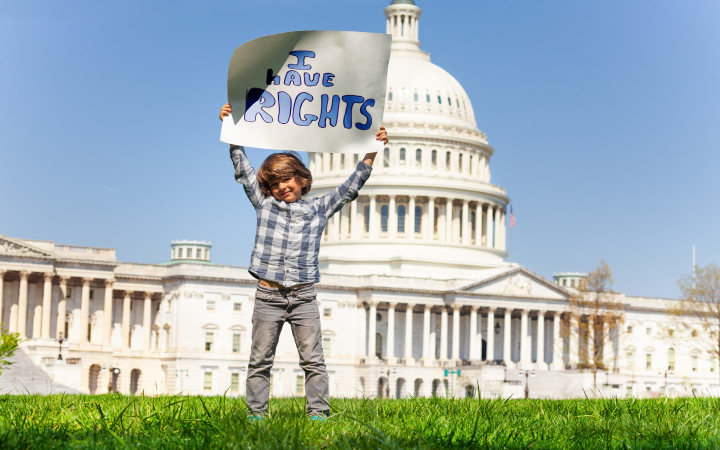Today’s Wonder of the Day was inspired by Tyson. Tyson Wonders, “Why do kids have less rights??” Thanks for WONDERing with us, Tyson!
Freedom of speech. Freedom of religion. Freedom of the press. These may sound familiar—they’re rights given to many people across the globe. In the U.S., they’re protected by the First Amendment to the Constitution.
As a kid, though, you may have WONDERed . . . do these rights belong to you, too? The answer is yes! Kids do have rights. In fact, children enjoy certain inalienable rights just as adults do.
However, there are some cases in which kids’ rights are treated differently from those of adults. One example can be seen in the U.S. Here, school systems can limit students’ rights to speech and expression while they’re at school.
That means that, while at school, students have to follow rules that may restrict these rights. For example, kids may get in trouble for using inappropriate language at school. They may also be required to follow a dress code that limits some forms of expression.
In some cases, schools have even carried out searches of student bags and backpacks. At first, this may seem like an invasion of privacy. But The Supreme Court has also sided with schools in these cases. It ruled that the school’s need to provide a safe learning environment comes before student rights to privacy.
There are other rights kids don’t enjoy until they become adults. These are restricted until a person can be expected to have a certain level of maturity or ability to think logically. For example, kids don’t have the right to vote—they have to wait until they turn 18.
Which rights belong to kids without restriction? This can vary depending on where in the world a child lives. However, certain rights are guaranteed to kids worldwide. In 1989, the United Nations General Assembly adopted the Convention on the Rights of the Child. This treaty is guided by four principles: non-discrimination; children’s best interests; life, survival, and development; and inclusion and participation.
Other groups have also set out to define kids’ rights. In 1990, the children’s media network Nickelodeon published a Declaration of Kids’ Rights. This was based on America’s Bill of Rights. It sought to establish once and for all that kids have rights, too.
What happens when kids’ rights are violated? Parents, teachers, and even social workers work together to protect children in these cases. Sometimes, kids are removed from situations in which their rights have been violated. If you feel that your rights have been affected by someone else’s actions, talk to a trusted adult.
Which rights are most important to you? Are there any rights you think should be guaranteed to people everywhere? Talk about your thoughts with a friend or family member today.
Standards: C3.D2.Civ.4, C3.D2.Civ.8, CCRA.R.4, CCRA.L.3, CCRA.L.6, CCRA.R.10, CCRA.R.2, CCRA.R.1, CCRA.SL.1, CCRA.L.1, CCRA.SL.4, CCRA.L.2, NCAS.A.1, NCAS.A.2, NCAS.A.3




